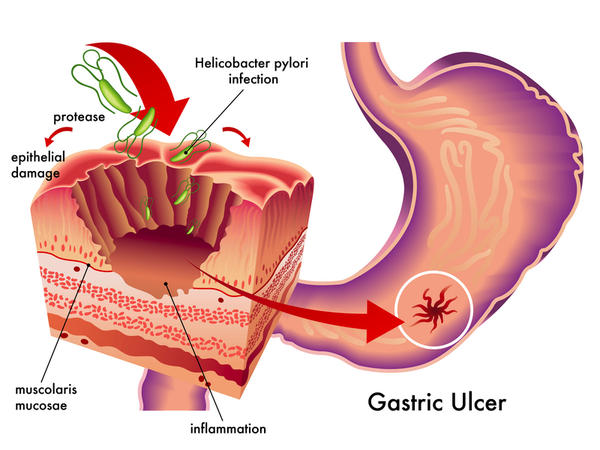
By Dr. Justin Marchegiani
What causes H. pylori infection? Did you know that over 50% of the population has an H. pylori infection (1)? Dr. Marshall, the scientist who discovered H. pylori, won the Nobel Prize in medicine in 2005 for his discovery. His initial research was done on himself, as he infected himself to prove the bacteria's causal connection with gastritis (inflammation of the stomach).
H. pylori is an opportunistic infection that spreads more rapidly in people that have a compromised immune system. This is why there are higher rates of all parasite infections in Third World countries. In the United States, we are seeing an increase in chronic stress and poor eating habits, which compromises our immune function and makes us open for an attack.
H. pylori, unlike other parasitic infections, can be spread very easily via saliva and doesn't require sexual intimacy per se. This is why it's very common to see an entire family test positive for an H. pylori infection. Things like sharing a drink or silverware can be enough to spread the infection in a compromised individual.
One of the biggest problems with H. pylori is its production of a specific enzyme called urease, which essentially neutralizes hydrochloric acid due to its increased production of ammonia. Hydrochloric acid is needed to help digest protein, ionize minerals, and create an acidic environment in the guts to stimulate bile release from the gallbladder, which aids in fat digestion in the small intestine.
If we can't ionize our minerals properly, this will lead to a whole host of issues, including osteoporosis, immune problems, thyroid problems, and anemia. Lack of hydrochloric acid will also lead to indigestion, malabsorption, gas, bloating, and a catabolic physiology (your body breaking down faster than it can build up).
A large percentage of H. pylori infected patients will not present with any symptoms, so it's possible you could be feeling great and still have an infection. This is also why my recommendation for anyone with an H. pylori infection is to supplement with hydrochloric acid and enzymes to ensure optimal digestion, even if no digestive symptoms are present.
It's important to note that the enzymes and hydrochloric acid by themselves will not be enough to eradicate the infection. A proper assessment should be made by your functional-medicine doctor regarding your primary physical, chemical, and emotional stressors to ensure long-term eradication of the infection.
Click here to eradicate your H pylori infection!
H. pylori also irritates the stomach lining, hence its connections with gastric ulcers. This essentially creates silent inflammation, and now your adrenal glands have to come to the rescue to put out the smoldering fire in your gut. Your body uses cortisol from the adrenal glands to help put out the fire. But as your adrenals become more fatigued, cortisol will lose its capability of keeping the fire under control. This is the point where you will start to see the exacerbation of your symptoms. Many people can have this infection for a long period of time and not necessarily have any symptoms until their adrenals drop into stage III adrenal fatigue.
H. pylori is a gram-negative bacteria. What this means is that H. pylori has two cell walls while most bacteria (gram positive) only have one cell wall (see picture below). When there are two cell walls, it makes it harder for antimicrobial medicines and herbs to eradicate the infection. This is analogous to a castle with stone walls for protection also being surrounded by a moat, which makes it more difficult for any intruders to invade.
In between the first and second cell wall, there is something known as efflux pumps. These pumps have the ability to disperse the antibiotic medicines that were given to the patient back outside into the gastrointestinal tract. These efflux pumps are believed to significantly contribute to antibiotic resistance, which is so prolific today (2).
When the antibiotics are pumped back into the gastrointestinal tract, patients can experience more die-off reactions. These reactions can include fatigue, nausea, bloating, flu-like symptoms, and diarrhea. H. pylori has obviously adapted in a way that has made it more resistant to antibiotics. This is one of the main reasons why I'm such a fan of herbal medicines, as they can be used for longer periods of time and don't seem to have the same side effects as antibiotics.
The other major issue with gram-negative bacteria is that the outside of the bacteria is toxic. This toxin is known as lipopolysaccharide (LPS), or endotoxin, which is actually toxic to the liver. The more H. pylori becomes eradicated from your body, the more your detoxification pathways become stressed from the toxic debris! This is why I find removing the infection over a longer period of time and using additional herbs to help with drainage and detoxification can be beneficial in reducing those die-off reactions.
 Exams and Tests for H. pylori
Exams and Tests for H. pyloriPatients who have H. pylori and also have an ulcer are most likely to benefit from being treated. The treatment does not work in all patients.
Treatment must be taken for 10 to 14 days. Medications may include the Prevpac, which is a combination of three antibiotics.
It's very important the right combination of herbs as well as the right dosage of herbs are used. I strongly recommend a customized program by a functional-medicine doctor specific to your needs. This will give you the best chance of removing the infection the first time without terrible die-off reactions. If you have any of the symptoms mentioned in this article, click here to schedule a complimentary consult.
References:
1. Yale J Biol Med. 1998, Helicobacter pylori: the Middle East scenario.
2. Biochemical Pharmacology 2000, Antibiotic Efflux Pumps Francoise Van Bambeke et al.
3. Phytomedicine. 2010, The effect of mastic gum on Helicobacter pylori: a randomized pilot study.